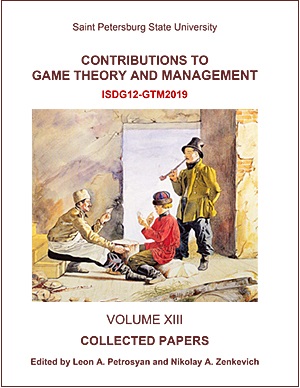On the Existence of Stationary Nash Equilibria in Average Stochastic Games with Finite State and Action Spaces
DOI:
https://doi.org/10.21638/11701/spbu31.2020.16Abstract
We consider infinite -person stochastic games with limiting average payoffs criteria for the players. The main results of the paper are concerned with the existence of stationary Nash equilibria and determining the optimal strategies of the players in the games with finite state and action spaces. We present conditions for the existence of stationary Nash equilibria in the considered games and propose an approach for determining the optimal stationary strategies of the players if such strategies exist.
Keywords:
Markov decision processes, Average stochastic games, Stationary Nash equilibria, Optimal stationary strategies
Downloads
References
Downloads
Published
How to Cite
Issue
Section
License
Articles of "Contributions to Game Theory and Management" are open access distributed under the terms of the License Agreement with Saint Petersburg State University, which permits to the authors unrestricted distribution and self-archiving free of charge.




